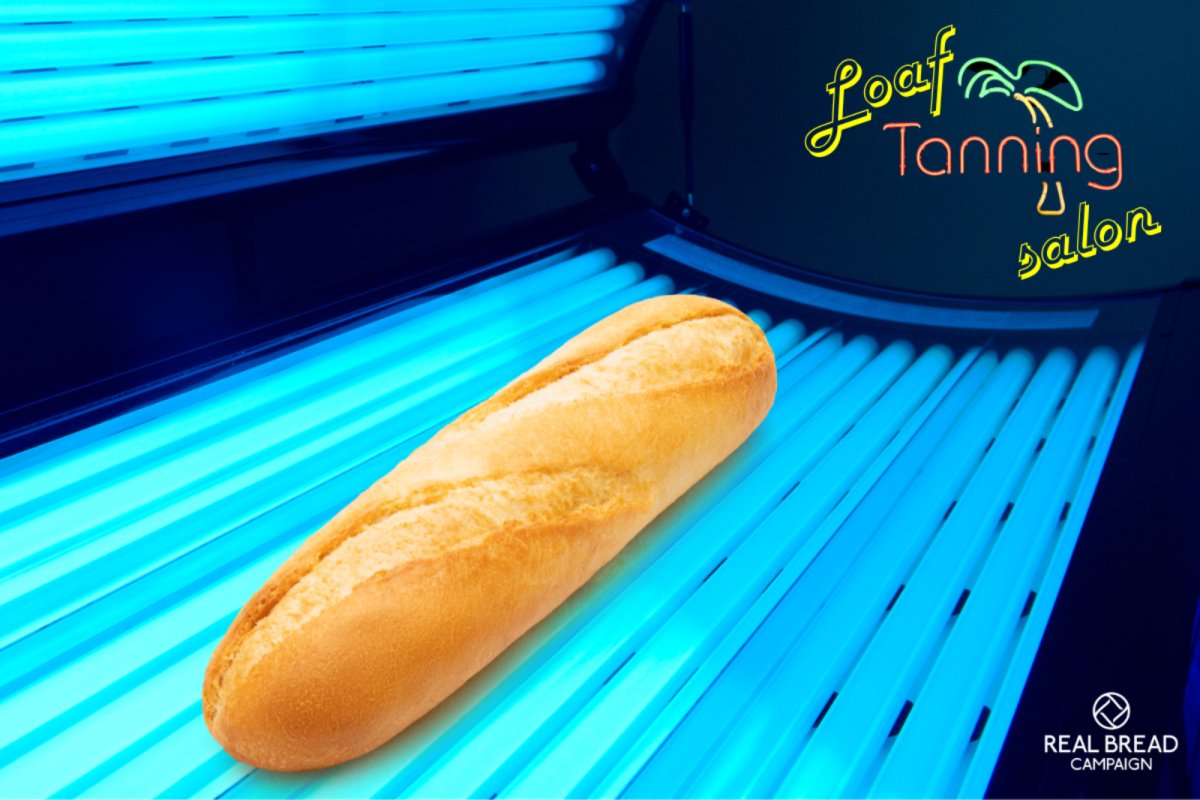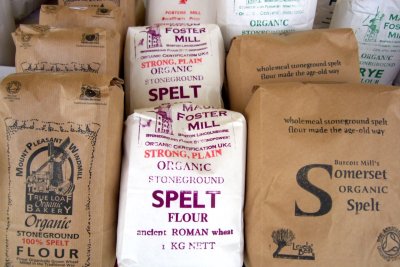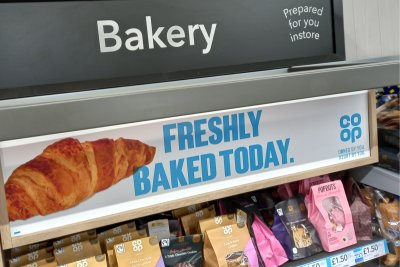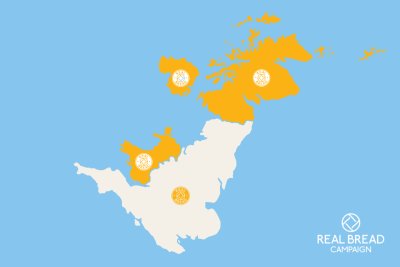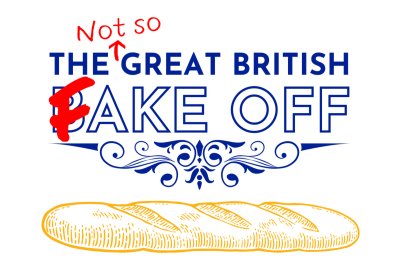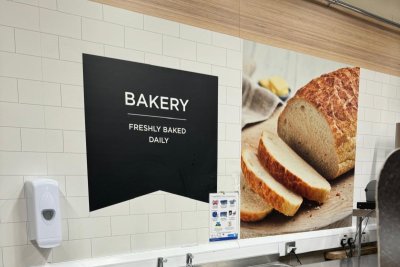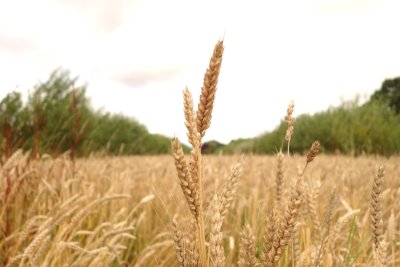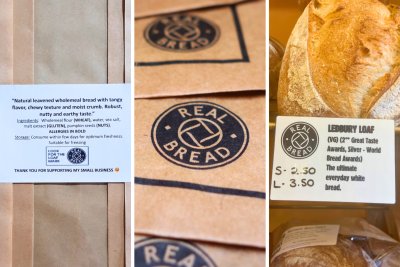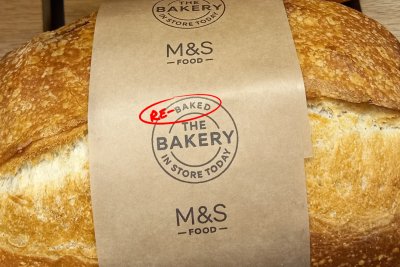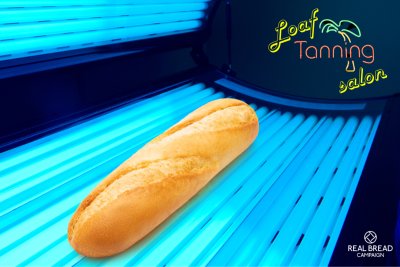 Half-baked claims. Credit: Chris Young / www.realbreadcampaign.org CC-BY-SA-4.0
Half-baked claims. Credit: Chris Young / www.realbreadcampaign.org CC-BY-SA-4.0
Have you spotted a freshness claim in the ‘bakery’ section of a supermarket where you know for sure there is nobody on site making bread fresh from scratch?
The Real Bread Campaign is calling on Real Bread lovers to call out examples of The (not so) great British fake off.
Take photos or videos of claims like ‘freshly baked’, ‘baked in store’, ‘baking throughout the day’ and post them on social media using the hashtags #freshlyfaked and #RealBreadCampaign
What this is about
On 4 March 2024, British Baker reported that ‘Sainsbury’s is planning to remove scratch baking from more of its in-store bakeries…’ The retailer was not forthcoming about how many staff members, stores or customers would be affected. The article went on to note that no Aldi, Asda or Lidl store makes baked goods on site, though did not mention the situation in any other supermarket chain.
Sainsbury’s is planning to replace an unspecified number of in-store bakeries (places that make bread and other baked good from scratch) with what the industry refers to a the ‘bake off’ system and the Real Bread Campaign calls loaf tanning salons. Bread (and/or additive-laden, UPF products marketed as ‘bread’) – are made and baked elsewhere (some even overseas), chilled or frozen and then re-baked in-store to add colour and crispness to the crust.*
The law
In its guidance document Criteria For The Use Of The Terms Fresh, Pure, Natural etc. in Food Labelling, the Food Standards Agency highlights that general food law ‘requires that the labelling, advertising and presentation of food, and the information made available about it through whatever medium, should not mislead consumers’.
It also notes that ‘the labelling, advertising and presentation of a food must not be such as could mislead a purchaser as to the characteristics of the food and, in particular, as to its nature, identity, properties, composition, quantity, durability, origin or provenance, method of manufacture or production.’
With specific reference to bakery marketing, the guidance states: ‘Terms such as “freshly baked”, “baked in store” and “oven fresh” may mislead consumers into believing that they are being offered products that have been freshly produced on site from basic raw materials. Some stores sell bread made from part-baked products that have been packed in an inert atmosphere or frozen off-site then “baked off” at in-store bakeries. Use of terms like “freshly baked”, “baked in store” and “oven fresh” on these products could potentially infringe the general legal provisions’
As part of our Honest Crust Act proposals, the Real Bread Campaign continues to lobby for updated and improved regulation of freshness claims to better protect shoppers from being misled.
Why this matters
As we note in our 2010 report Are Supermarket Bloomers Pants?, and its 2018 sequel Are Supermarket Bloomers Still Pants?, we have three main areas of concern about the loaf tanning salon system and how the products are marketed:
- Fewer skilled jobs for local people.
- Unfair competition.
- Potentially negative environmental impact.
A loaf tanning salon (in which someone with minimal to no specialist training does little more than putting ready-made products into an oven and turns on the timer) does not provide skilled baking jobs to people from that store’s local community.
There are a range of reasons that a small, local independent bakery needs to charge what it does in order to remain financially sustainable. At the other end of the economy of scale, and with the ability to defray costs elsewhere in the business, a supermarket can undercut a local bakery. Misleadingly to state or imply that loaf tanning salon products and/or how they are produced, are the same as Real Bread made from scratch is unfair competition.
At the risk of stating the obvious, baking a product twice uses around twice as much energy as baking product once, so has a larger carbon footprint.
As anyone who has found a day-old loaf tanning salon baguette to be a fair substitute for a tack hammer knows, the process can lead to products that stale very quickly. This results in a greater potential for food waste, at a cost to both the shopper and the environment.
*Typically, pastries are made off site and receive their first and only baking in-store.
Real Bread Campaign: The Real Bread Campaign finds and shares ways to make bread better for us, better for our communities and better for the planet. Whether your interest is local food, community-focussed small enterprises, honest labelling, therapeutic baking, or simply tasty toast, everyone is invited to become a Campaign supporter.
Sustain
The Green House
244-254 Cambridge Heath Road
London E2 9DA
020 3559 6777
sustain@sustainweb.org
Sustain advocates food and agriculture policies and practices that enhance the health and welfare of people and animals, improve the working and living environment, promote equity and enrich society and culture.
© Sustain 2024
Registered charity (no. 1018643)
Data privacy & cookies
